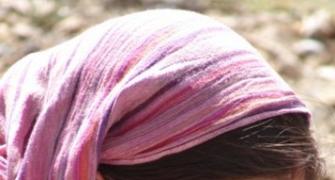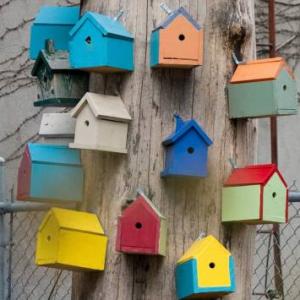Prashant Lingam and Aruna Kappagantula are changing the way houses are being built in India.
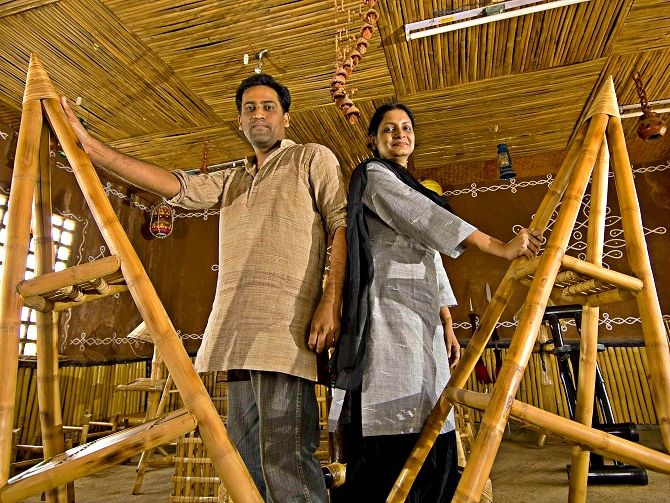
Prashant Lingam and his wife Aruna Kappagantula are well-known as the 'Bamboo Couple', individuals who have popularised the concept of eco-friendly bamboo houses for urban India.
The Hyderabad-based couple gives lectures these days on their business model at B-schools like Harvard, Kellogg, Cornell, etc.
It wasn't always like this.
There was a time they were scorned for their failed business model.
There was a time when there was no food on their table.
It took seven years of struggle, of being neck deep in debt and without money and food for them to reach where they are today.
This is their inspiring story of courage, persistence, patience and belief in their dream.
Prashant spoke to Rediff.com's Shobha Warrier.
It started with a sofa set
I was an entrepreneur, quite a successful one, and Aruna was into academics doing her PhD.
What brought us together was the left ideology we both believed in.
We were just married and Aruna wanted to buy an eco-friendly sofa set for our house, but we couldn't find the sofa set we were looking for anywhere in Hyderabad.
Searching for bamboo furniture, we reached the India-Bangladesh border.
Our plan was to buy the furniture and come back, but what we saw in the village floored us.
The entire population of the village was in some way or the other involved in bamboo-related activities. But they made only very small things like baskets, chairs, etc.
We had seen pictures of bamboo houses in many places all over the world.
With the abundance of bamboo around, why did they not make bamboo houses, we wondered.
Once we are back in Hyderabad, we shared our idea of making bamboo houses with our family, but they were not enthusiastic about it.
Our family felt why we should take a risk when we were doing financially well, and when Aruna was pursuing her PhD.
They found the idea of going to villages deep inside the forests and working with the communities without even knowing their language weird, but we found it exciting.
As I was already a businessman, I found the idea unique and challenging.
Setting up shop
Both of us thought about it a lot and somehow, we couldn't stop ourselves from pursuing it.
As I had some savings from my business of importing machinery from China, we decided to plunge into this against our families' wishes.
We had to study the raw material and its possibilities first, and for that, we had to go in to the forests.
The year was 2008. We spent the next one-and-a-half years travelling to the forests of the North East, Kerala, Andhra, Telangana studying the material, the people working on it and their craft.
Wherever there was bamboo, we were there.
We felt that to understand bamboo, we had to go to the forest, live with the communities and see what they were doing.
Other than learning about bamboo, we also learnt about the people and their lives, and it was such a humbling experience.
They welcomed us with so much happiness and made us stay with them in their homes sometimes.
They might be struggling for one meal a day, but they would give the food first to the guest.
Despite the hardships they had to go through and the extreme poverty they had to face, they appeared quite happy and content unlike us city folks.
Deep down in the forest, away from the corrupt city life, they remain simple and innocent.
It was such an unforgettable learning experience for both of us, one that we would not read in any books or learn in any school.
Though we began with the idea of doing something different and challenging, our travels to the forests changed our outlook.
When we saw how the extremely gifted craftsmen lived in abject poverty, we felt our dream should not be just making bamboo houses, but making their lives also better.
We felt it was our responsibility to do so.
We also realised the path chosen by us was going to be risky.
We were going to enter unknown territory.
We were going to work with people who live in the forests and we didn't even know their language. But we were charged up.
After one-and-a-half years of travelling, we set up an office and a workshop in Hyderabad and brought in 20 craftsmen to work for us with an initial investment of around ₹3 to 4 lakhs.
Only when we began the work, did we come to know that we missed out on the most important aspect -- there was a Forest Act that did not allow anyone to transport bamboo from the forest.
There were government regulations and a lot of restrictions involved in transporting bamboo.
This came as a rude shock. We had already spent lots of money.
Again, our families intervened and told us to stop our adventure.
Somehow, we could not leave our dream unfinished.
After much deliberation and road blocks -- but strictly following government regulations -- we transported two truckloads of bamboo from Tripura and Assam to Hyderabad.
Even today when we look back, it was a nightmarish experience we can never forget.
It was from Google that we learnt the treatment technique for bamboo and also how to construct a bamboo house as there was nobody to guide us.
Those who are in the construction sector are into brick and cement, and nobody was interested in building houses with bamboo.
If not for Google, we would not have been able to do anything.
We followed the techniques and designs used by people in Latin America.
Then came the toughest part -- making people believe in bamboo houses.
We asked many people in Hyderabad whether anybody would like to build a house with bamboo.
Nobody was interested. Nobody had seen such houses and they didn't want to take the risk.
We kept knocking at doors, but no door opened for us.
In fact, there were people who blocked our numbers.
By then, one more year passed, and all our funds were exhausted.
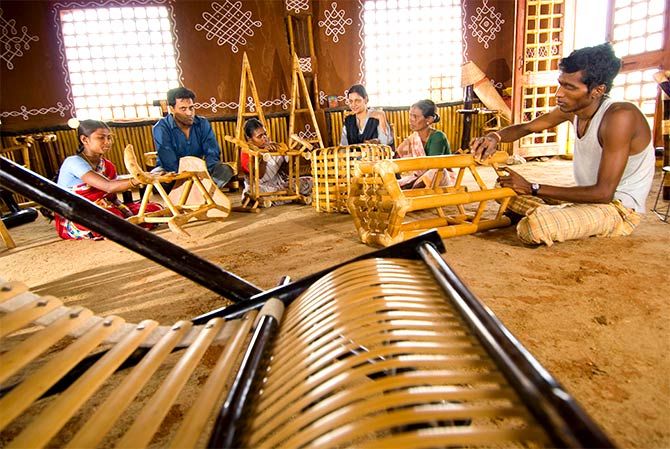
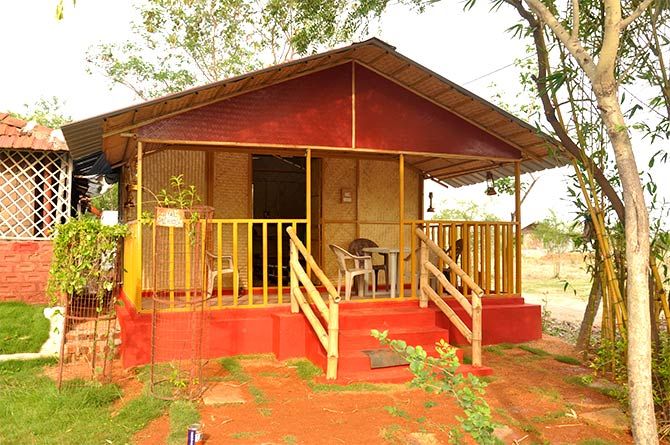
From having no work, their workshop has grown to 30 people working three shifts.
No breakthrough even after three years
In the first 6 months of starting Bamboo House, we had exhausted all our resources.
Then, we started borrowing from relatives and friends.
There was none we knew from whom we had not borrowed money because our monthly salary bill itself was around ₹2 to 3 lakhs.
Because we chased our dreams relentlessly and fearlessly, by the end of the third year, we ended up with a debt of ₹60 lakhs.
Even after three years, we were not able to build a single house.
We were still trying to convince people and were clueless about why things were not working out.
We started out because we saw an excellent opportunity in the field.
We couldn't understand where we went wrong.
Finally, we decided that we had taken the wrong path and the idea of bamboo houses would not work in this country.
Though we didn't want to give up on our dreams, we felt defeated.
Even the one government bamboo mission in Delhi had closed by then as no work was happening in bamboo.
Nothing was going right for us.
We survived a huge bomb blast on one of our visits to the North East.
I was kidnapped twice; once in Tripura and the second time in Manipur.
When you are not a local and you travel to the interiors, they feel you are a threat to them.
Though they didn't physically harm me, the kidnapping rattled me emotionally.
Luckily, they let me go the next day both times.
I also sustained an ankle injury which made me an invalid for sometime.
During the same period, Aruna delivered our first baby and she developed post-pregnancy complications.
For almost one-and-a half years, both of us were bed ridden.
After I lost my father, my mother went into depression unable to bear his loss and also because of the condition I was in.
Aruna also lost her father. During this period, we lost six people from our family.
We had no other option, but to wind up our workshop and ask our workers to go back to their villages.
Their salaries were pending and both of us were bed ridden and in no position to start trying again.
The situation was so bad that there was nothing to eat at home.
We didn't know from where our next meal would come from.
We were in so much debt and there was no one from whom we could borrow money.
Those days, we had only one meal in the afternoon.
There was no money, there was nothing to eat and people around us were dying.
When people to whom we owed money started asking for money, we developed suicidal tendencies.
The badly needed first break
Then in 2013, once I was back on my feet, we decided to give our dream one more try; the last one.
One night, we sat together and gathered whatever jewellery my mother had; we had kept this as a reserve for a medical emergency.
We sold the jewellery the next day and got ₹60,000, and I convinced my mother to let me invest the amount in the bamboo business.
We got our first break after this.
An elderly couple in Hyderabad wanted to construct a very simple and low-cost structure on their terrace.
When we heard that the bamboo structure made by an architect collapsed, we went and met them and asked them to give us a chance. But they didn't want to invest any more money on the project.
We were so desperate that we said we would make the structure for ₹60,000, and if nothing happened to it even after six months, they could pay us.
By then, we had called and met so many people, but nobody was interested.
So, when we met a couple who were willing to experiment, we didn't want to lose them.
When they paid us ₹90,000, we were so thankful that we told them to give us just the cost as they gave us the first break for which we had been struggling for seven years.
The small house we built on the terrace became the turning point.
As it was on the terrace, many people noticed it and were impressed.
The media found it very interesting. I can never forget the support I received from the media.
If not for them, so many people would not have heard about what we were doing.
In the next three years, we built 150 houses!
We did the interiors of many big corporate houses like Google, Infosys, the US consulate, etc and our work was appreciated.
If we were idle for three years, the next three years, we had no time to breathe.
That's how our life turned around.
In the first year, we had no idea why people rejected our idea and in the next three years, we had no idea why people loved our idea so much!
Suddenly, we found that people wanted their houses natural and eco-friendly and not iron and steel structures.
We worked round the clock.
From no work, our workshop became active with 30 people working three shifts.
We had to make up for all those lost years.
Almost every day, we were delivering a sofa set from our workshop.
In the next three years, our knowledge of the material improved and along with that, our confidence grew.
Other than farm houses, tents, yoga centres, gyms, children's study rooms, we built 2-bedroom, 3-bedroom and 4-bedroom houses, even a three-storey house in bamboo.
We had no designers or mentors or anyone to guide us; we learnt everything on our own.
We and our team designed everything.
As we continued to study and experiment in our workshop, we also learnt how to bring bamboo from various states within the law.
Repaying debts and touching ₹1 crore turnover
In these three years, I repaid almost all my debts of ₹60 lakhs. Today I have only ₹12 lakh left to be paid.
Though we will touch ₹1 crore turnover this year, our main focus was never making profits.
We want recognition for bamboo as an alternate building material.
If people like what we are doing, if bamboo gets recognition, the market will come to us anyway.
We never said 'no' to any project because the profit was less in it; money was not our priority although we were not financially sound.
During our struggling days, we had gone to many business schools and asked them to fine tune our business model.
Not a single B school helped us. All of them said the business model we had would not work in India. We were so disappointed to hear such comments.
Today, B schools like Harvard, Kellogg, Cornell, ISB and ICFAI have invited us to give talks on our business model.
I dropped out of my MBA to be an entrepreneur, which was ridiculed by many people then, but today I give talks at various management schools.
During our struggling days, we used to go to engineering colleges to get young people to work with us.
All of them refused as they were used to only cement and bricks. Today, we are invited regularly by most of these engineering colleges to give lectures on our business model and construction techniques.
In 2014, when the World Bank compiled our work (our construction technique, systems we use, our effort to popularise an alternate building material), we felt it was worth all the trouble we went through.
In 2015, we received an invitation from the United States State Department.
Aruna went to the US as a State guest. She even got a chance to go to the White House and meet (then US President Barack) Obama.
It is so gratifying when the world recognises your efforts, especially after what we went through.
The government of Kenya has invited us to guide them to make bamboo houses, furniture and everything connected with bamboo there and develop local livelihood.
They have a lot of bamboo there and they want us to train people, teach them the technique and develop a business model for them.
It's a one-year programme and our team will be stationed there training the locals.
Our job is to create local employment using local material.
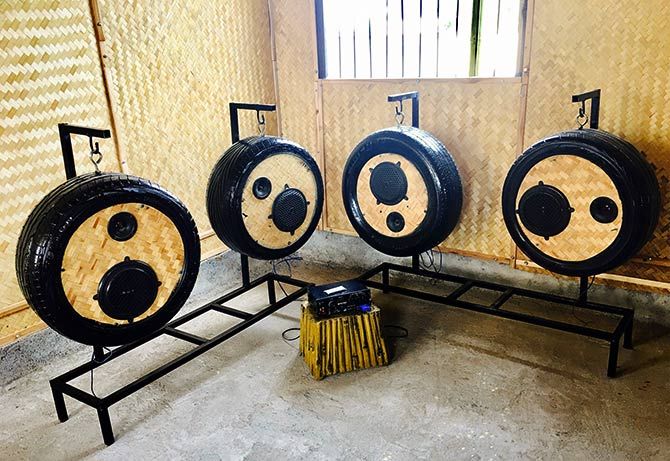
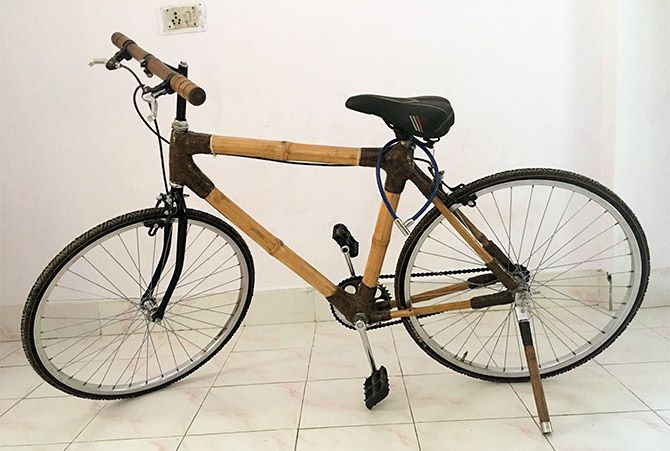
Other ventures
In 2016, we started our second venture, Recycle India where we convert crap into furniture, like making structures out of plastic bottles, used tyres, and recycled drum furniture.
We are on a mission to convert the cement benches in public parks to benches made out of discarded tyres.
This is a continuation of our efforts to be responsible to the environment we live in.
In 2017, we made a bamboo bicycle on which we had been working for the last 2 years.
We launched it in March and we hope to commercialise it by August-September.
We are looking at the possibility of exporting these bicycles to European countries that use bicycles as a mode of transport and favour eco-friendly products.
We plan to adopt an entire village and train them to make these cycles once the commercial part begins.
It could be a livelihood project for these villages as they are entirely hand made.
We are also talking to various state governments, so that we can do this project in collaboration with them.
The business model
If you ask me what our business model is, I would say, there is no business model.
Though our aim was to help the craftsmen we met in the forest, we didn't want to confine ourselves to any model.
If we fix a model, it restricts our liberty to innovate and work.
What we thought was, there is a material and there are livelihoods at stake; we could bring the material and the people to the mainstream through our model.
That's why when we learnt about the Forest Act, we decided to adhere to it and work accordingly.
We decided to create a benchmark as nobody was using bamboo as a material to build houses in India.
Looking back, looking forward
Aruna and I are clueless how we underwent all the rejections with a small baby in hand.
Maybe it was the support we were to each other that helped us through those dark periods. Both of us believed in each other, and our dream.
Even today, we don't give up; we fight, come what may.
It also could be the leftist ideology we both believe in. It is so deep rooted within us that perhaps it helped us remain strong.
We felt then that even if we tried some other business, there would be challenges there.
We decided to face these challenges as we felt if we could establish ourselves, we would be able to do something for the next generation.
It was an idea worth fighting for.
Before we started our bamboo journey, I was a successful entrepreneur owning three cars and enjoying a lavish lifestyle.
Three years later, my life turned 360 degrees and we had nothing to eat.
Those 6, 7 years of struggle were a great learning experience, which made us very mature, humble, philosophical and simple.
We value and respect struggle.
We respect hunger today because of those 7 years.
We respect food and think of those thousands of children who go hungry every time we sit down to eat our food.
When we saw raw life in the forests, we realised that compared to the struggle they go through every day, what we went through was nothing.
Today, my mother is a happy person; her only complaint is that she sees me more on TV than in person.
All those relatives who made fun of me now speak very proudly about what we do.
We do not know how far we would have continued if we didn't get that big break.
I am 40 and Aruna is 38; our dream is to set up an entire ecosystem in bamboo by the time we are in our 70s.
We are the largest producers of bamboo after China, but we do not make use of this natural material at all.
We want people to understand the potential of building houses with bamboo, and we want people to understand that whenever they buy something made of bamboo, they are indirectly helping the livelihood of those villagers who are involved in it.
We are happy to see that there are many entrepreneurs who want to make bamboo houses today.
We alone cannot make an impact pan India. When more entrepreneurs are involved in this field, the livelihood of more villagers will be taken care of.
We can take care of the livelihood of 10,000 villagers in a year directly or indirectly and it is a small number.
If there are 10 or 100 people like us, imagine the kind of impact it will have on the livelihood of the villagers!
Also, we are creating a world that is in tune with nature, that is environment friendly.
We believe that every citizen of this world has a moral responsibility to nature and environment.
We believe that it is our duty to leave a better world for the future generation.
Readers can get in touch with Prashant and Aruna at bamboohouseindia@gmail.com



